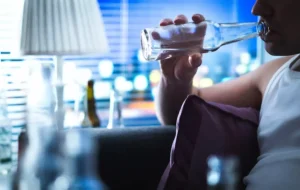The good news is that treating both alcohol misuse and depression can make both conditions better. As you get older, body changes can affect the way medicines are absorbed and used. Because of these changes, there can be a larger risk of drug interactions among older adults.
Major depressive disorder
Naltrexone, Acamprosate, and disulfiram are also FDA-approved medications that can help curb alcohol cravings. “Therapeutic interventions designed to address both issues often include a focus on addressing emotional pain or trauma, as well as developing and practicing healthy coping behaviors,” says Kennedy. Because of this shared connection, treatment for both should include a diet to improve gut function and reduce endotoxin load that contributes to neuroinflammation. Following a Mediterranean diet rich in omega-3s, for example, might be one recommendation. Researchers agree that alcohol and depression have a bidirectional relationship, meaning that depression can cause overuse of alcohol, but overuse of alcohol can also cause depression.
Treatment for Depression and AUD

And because alcohol drains the brain of both dopamine and gamma-aminobutyric acid (our “safety” neurotransmitter), we’re left with “little of our own, natural chemistry to create senses of pleasure or hopefulness,” Goodwin says. Sign up for free and stay up to date on research advancements, health tips, current health topics, and expertise on managing health. It’s a vicious pairing that can be difficult to overcome; however, treatment can be effective.
- In particular, she’s committed to helping decrease stigma around mental health issues.
- Without treatment, episodes may last a few months to several years.
- Mental health professionals lead some support groups, but groups can also be peer-led.
Why does depression make recovery from AUD harder?
Outpatient settings offers much of the same programming as inpatient treatment but is relatively less time intensive. Patient are able return home or to other living situations outside of treatment hours. Outpatient treatment may only be an option if a person’s current level of physical dependence does not necessitate the need for inpatient treatment.
Alcohol and Depression: The Link Between Alcoholism and Depression
From 2012 to 2019, the year over year rise in deaths rates averaged about 4% per year, and then jumped during early pandemic years, with the biggest rise from 2019 to 2020. Other data mirror this trend – emergency department (ED) visits for SUD are on the rise and account for twice the number of ED visits compared to opioids. Alcohol related ED visits account for nearly half of all SUD related visits (45%), far higher than the next highest group, opioids, accounting for 13% of ED visits. Your provider may order medical tests, such as blood tests, to see if any underlying medical conditions are causing your depressive symptoms. Depression often has warning signs, such as a low mood, feeling fatigued or having trouble sleeping. Discuss your friend or family member’s past episodes with them to help them improve their ability to recognize the signs early.
For some, brain stimulation therapies may be effective, typically after other treatments have not been effective. Some people also worry that they’ll feel uncomfortable around new people without a drink or two to help them relax. But there are ways you can meet new people and form friendships without any alcohol involved. A doctor can recommend a safe schedule for tapering off alcohol consumption and advise on which symptoms to look out for. People who consumed a lot of alcohol in settings such as bars and parties can also feel lonely after quitting drinking. Because alcohol can make you lose your inhibitions and act more impulsively, it may lead to actions such as self-harm or suicide.

But depression is different in that it persists practically every day for at least two weeks and involves other symptoms than sadness alone. Share your thoughts, fears and questions with other people who have loved ones with similar conditions. Connect with others through online message boards or NAMI peer-education programs. Don’t scold or blame people with depression or urge them to “try harder” to “just be happy.” Instead, make specific offers of help and follow through with those offers.
- However, individuals suffering from depression who are not in active treatment are more likely than the general population to be alcoholics.
- Anyone who suspects they have depression or who would like to reduce their alcohol intake but are having trouble should see a doctor.
- During therapy, you can learn coping mechanisms that can help you return to life without drinking.
- As a result, you could drain your bank account, lose a job, or ruin a relationship.
- Research shows that people who drink alcohol are more likely to develop mental health problems.
